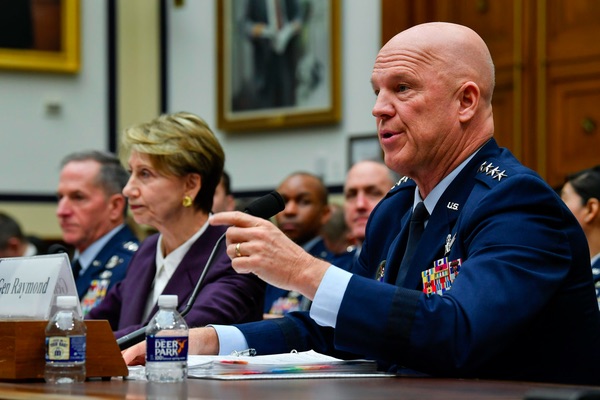The US Space Force’s long warby John Hickman
|
| The first battle is to overcome the strange novelty of a military branch dedicated to operating in outer space. |
If the struggle for legitimacy has only begun, the US Space Force has at least won acceptance by a majority of the public. However, acceptance is not the same as legitimacy. The new armed service could be re-absorbed into the US Air Force without the public voicing opposition. Imagine the public uproar though if a future administration attempted to absorb the Marine Corps into the Army. Without establishing legitimacy, the new service confronts an existential risk.
As the Space Force is more fully staffed, fewer sacrifices will be offered up to the comedians and fewer unintentional affronts made to potential allies. And given the passage of time, the association with Trump will fade in historical memory if future decision-makers are able to share credit for Space Force successes. However, there are three larger battles ahead in the struggle for legitimacy.
The first battle is to overcome the strange novelty of a military branch dedicated to operating in outer space. That the Space Force is the first of its kind anywhere makes that task especially difficult. So too does the mistaken perception that it may duplicate the mission of NASA. History shows that creating new military service branches is often met with political and bureaucratic opposition. The British Royal Air Force was created near the end of the First World War from the British Army’s Royal Flying Corps and the British Royal Navy’s Naval Air Service. The end of the Great War left it politically vulnerable. Only devising a new mission—patrolling the rebellious parts of the empire on the cheap—saved it from being reabsorbed into the British Army. The metamorphosis of the US Air Force from the US Army Air Corps was also controversial, and its survival assured only by the Cold War.
Resistance to the idea of a military branch dedicated to operations in outer space may fade as Americans grow accustomed to the idea. Legitimacy depends on familiarity as well as rationality. Whatever the functional rationale, the structure and naming of the armed services in national militaries is inevitably arbitrary. Few Americans think twice about the existence of the US Coast Guard as a branch distinct from the US Navy. Russians do not question why their Strategic Rocket Corps and Airborne Forces are separate branches. Chinese are unlikely to question why their navy is burdened with the name People’s Liberation Army Navy. Of course, every rule has its exceptions. Bolivians know exactly why foreigners smirk when they learn that there is a Bolivian Navy.
The second battle is to educate Americans about the mission of the Space Force, which is a problem because, in the near term, its operations will resemble an intelligence agency more than those of a combat arm. The public tends to envision Star Trek or Starship Troopers when they hear the name of the new branch. Learning that it will be responsible for operating fleets of surveillance satellites sounds more like the work of spies rather than soldiers, and segments of the populist Left and Right remain deeply suspicious of the intelligence agencies. That President Trump has channeled that irrational conspiracism to deflect criticism of his administration indicates its depth. Although most Americans are woefully uninformed about foreign policy and spaceflight, they nonetheless understand their dependence on communications and global positioning satellites. So even those oblivious to national security value of military satellites could be persuaded that advances in satellite protection would benefit them directly as a byproduct.
Over the long term, adding to the mission set of the Space Force would probably enhance its legitimacy. Respect for the military is associated with an understanding that soldiers take physical risks to protect the rest of the nation. Deploying even a few Space Force personnel in outer space for brief periods would represent the sort of newsworthy physical risk the public comprehends. Reminding Americans of the important historical role played by the US military in exploration and science here on Earth would help to justify those deployments.
| Together, these three battles for public perception comprise a long war to win legitimacy, without which the US Space Force confronts an existential threat. |
The third, and most difficult, battle is to change how Americans perceive outer space itself as a domain. Decades of science fiction have burdened the public with the sense that it is less than entirely real. That popular misperception tends to be reinforced by elite narratives characterizing outer space as appropriate for scientific research or business development but simply too exotic to be appropriate for international politics. Some still cling to the sense that outer space should be pristine and could be preserved that way, free of the effects of international political rivalries and associated militarization. Historical experience has proven that to be a vain hope.
Together, these three battles for public perception comprise a long war to win legitimacy, without which the US Space Force confronts an existential threat. Losing that long war would not mean its near-term mission would be unfulfilled. However, it would deprive the American space effort of a government entity potentially capable of competing with NASA in the risk-taking necessary to open frontiers. That such partial redundancy in government organizations has potential value seems counterintuitive if one assumes that existing institutional structures are already optimal. Yet some of the most effective entities in the US government, like those in the intelligence community, have bureaucratic competitors with similar, though not identical, institutional missions. Such competition can be beneficial to the nation in the long term.
Note: we are temporarily moderating all comments submitted to deal with a surge in spam.
